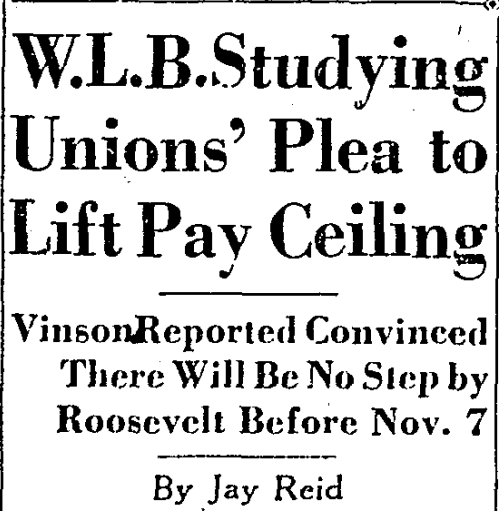Jay's Portfolio: W.L.B. Studying Unions' Plea to Lift Pay Ceiling
Vinson Reported Convinced There Will Be No Step By Roosevelt Before Nov. 7
New York Herald Tribune
October 10, 1944
By Jay Reid
Thirteen years to the day before Jay Reid became a father for the fourth time, his byline appeared on the front page of the New York Herald Tribune on an article that would see him cross paths (if only in print) for the first time with a government figure who would play an outsized role in his future career.
It turns out there were not many men with the surname Vinson in mid-1940s Washington. The Fred Vinson who Jay reported was convinced there would be no action by Roosevelt on pay adjustments before the election is the same Fred Vinson who in July 1945 would become secretary of the treasury and eleven months after that, chief justice of the supreme court.
Talk about an all-time career rocket ride.
In 20 months, Vinson would go from being just another bureaucrat to leading the entire judicial branch of the government.
Vinson remains the most recent chief justice nominated by a president from the Democratic party (Harry Truman).
(I’ll pause a moment to let that sink in.)
At this time, however, Vinson’s job is to play bureaucrat, and he plays that role well.
By October 1944, organized labor was completely out of control in its demands that the government, and by government we really mean FDR, who is running for an unprecedented fourth term as president, raise wages beyond what is allowed under the Little Steel formula.
Each little group in the labor movement has, by this time, showed its hand. Some groups have tried to flatter the president. Others have issued veiled threats. One group even went so far as to procure a copy of a secret government survey, the findings of which supported its main points.
FDR needed to pour cold water on these groups, but for political reasons, he could not be seen as the reason why wages would not be allowed to rise to the levels demanded by the unions.
So, as presidents are wont to do when they deliver bad news, Roosevelt had an underling own the unpopular decision.
Vinson took one for the team by going to the press and explaining how the wheels of the bureaucracy would not allow any final decisions to be made before the election. There just was not enough time to clear the various hurdles.
Beneath the issue of timing lay the real concern, one which Jay covered in detail: raising wages for so many workers would put upward pressure on prices, which may then cause inflation to increase.
In that case, union workers would emerge no better off than they were before, but non-union labor could find itself in a more precarious financial position.
These results would only damage Roosevelt’s political position. Hence, any changes had to be postponed until after the election.




